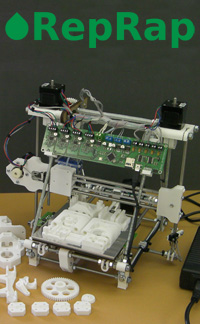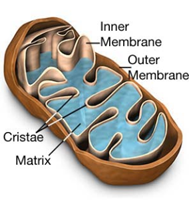SciBars
How useful are animal models in understanding the molecular and cellular mechanisms that underlie addiction?
|
As a warmup for the Royal Society Summer Science Exhibition we have invited one of the teams from the event to tell us about their work.
Dr Matt Parker of Queen Mary, University of London will talk about how studying the impulsive nature of zebrafish can tell us about the cycle of addiction, specifically, the move from occasional drug use to habitual and compulsive drug seeking, withdrawal and relapse. Dr Parker will discuss some of the difficulties associated with treatment, and how understanding more about the genetics and early markers of addiction may help to develop more effective treatments and even prophylactic interventions. |
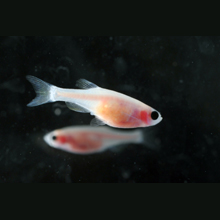
|
Date: Wednesday 26th June 2013
Time: 7pm, for a 7.30pm start
Place: Upstairs at The Lamb, 92 Lambs Conduit Street, WC1N 3LZ [gmap]
Cost: Free
You can learn more about the Zebrafish Neurobiology and Behavioural Genetics Group’s work and their exhibit at http://zebrafish-genetics.tumblr.com/
From Beer to Biscuits, the maths of food
|
Maths is often thought of as a dry subject, far removed from reality. However, this is far from the case, and in fact maths is very important in food! In this talk Prof. Chris Budd from the University of Bath will talk about some of the maths needed to make beer, how maths can help you cook the perfect potato and why maths is vital to the biscuit business.
So please come along, and drink some beer or eat a potato. |
 Biscuit perspective by Peter & Maggie |
Date: Monday 22nd April 2013
Time: 7pm, for a 7.30pm start
Place: Upstairs at The Lamb, 92 Lambs Conduit Street, WC1N 3LZ [gmap]
Cost: Free
Poster for this event for you to print out and hang up in your place of work/study!
|
Klaus Dodds will addresses the current controversies surrounding the present and future management of the Arctic region – at their heart lies a predicament about how to make sense of the Arctic as a highly dynamic, inhabited, resource-rich and increasingly accessible space.
Klaus Dodds is Profesor of Geopolitics at Royal Holloway, University of London and author of many books on geopolitics, security and the Polar Regions. He is a frequent visitor to the Arctic region and worked in Alaska, the Canadian Arctic, Greenland, Iceland and the Nordic Arctic. Date: Wednesday 27th February 2013 |

|
Building robots for fun and profit
|
Shadow is an unusual robotics company, founded as a group of amateurs wanting to develop robots that they thought no-one else was developing, and evolving into one of the world’s leading robotics engineering firms. On the way they’ve engaged with, and built robots for, everyone from the space community to the extreme end of the performing arts community.
Rich Walker is the Managing Director, a typical engineer/cat-herding role, having joined in the fun 20 years ago, because he wanted to write AI software. Rich was then told “we have to build the robots before we can write software for them”, and handed the wrong end of a soldering iron. He still wants to write AI software one day, but currently sets up European research projects, plans long-term roadmaps for the robotics community, and finds new and interesting things for the Shadow team to engage in. |
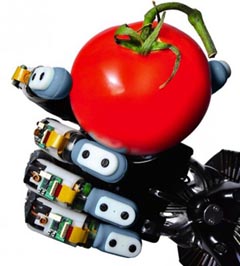
|
Rich will talk about what robotics is about, where it could go, and some of the interesting problems in the domain.
Date: Wednesday 27th March 2013
Time: 7pm, for a 7.30pm start
Place: Upstairs at The Lamb, 92 Lambs Conduit Street, WC1N 3LZ [gmap]
Cost: Free
Poster for this event for you to print out and hang up in your place of work/study!
Click here to leave a comment about this event
A world where anyone can make anything
Adrian Bowyer holds a first degree and a PhD in engineering from Imperial College. He was an academic at the University of Bath for 35 years, retiring from academic life in 2012 to help to run the company RepRap Professional Ltd. His areas of research are geometric modelling and geometric computing in general, the application of computers to manufacturing, and biomimetics.
Date: Wednesday 30th January 2013
Time: 7pm, for a 7.30pm start
Place: Upstairs at The Lamb, 92 Lambs Conduit Street, WC1N 3LZ [gmap]
Cost: Free
Click here to leave a comment about this event
The 1,000 mph engineering adventure
|
The BLOODHOUND Supersonic Car, launched by Richard Noble and Andy Green in October 2008 is set to take the land speed record into a whole new speed regime. The team, including researchers from Swansea University at its heart, plans to take a manned vehicle to 1000mph, increasing the current land speed record (763mph) by over 30%.
The target presents the team with massive scientific and engineering challenges, not least of which being how the car will stay attached to the ground at these speeds. The CFD (computational fluid dynamics) research team at The College of Engineering at Swansea University has been working on answering such questions, and predicting the overall aerodynamic behaviour of such a vehicle. The BLOODHOUND project is currently entering the build phase with vehicle completion expected in mid-2013. The car is then due to be tested in 2013 in an attempt to increase the World Land Speed Record from 763 mph to 1,000 mph. Dr Ben Evans from the BLOODHOUND team will answer both the how and the why questions related to this iconic project. |
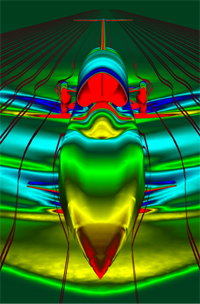
|
Ben studied for a PhD in Computational Fluid Dynamics at Swansea University, which led to his post-doctoral research on the development of unstructured mesh techniques for high speed flows with particular application to the BLOODHOUND supersonic car. He is currently employed as a lecturer in Aerospace Engineering in Swansea University’s College of Engineering and remains a member of the BLOODHOUND SSC design team.
Date: Wednesday 9th January 2013
Time: 7pm, for a 7.30pm start
Place: Upstairs at The Lamb, 92 Lambs Conduit Street, WC1N 3LZ [gmap]
Cost: Free
The great mitochondria transfer debate
On 19 November Science London joins forces with the Academy of Medical Sciences (AMS) to facilitate an open debate into the Human Fertilisation and Embryology Authority’s (HFEA) public consultation regarding novel techniques of mitochondria replacement.
If you missed this you can watch it online here or through the embedded video below.
A previous scientific review undertaken by the HFEA concluded that there is no evidence to suggest the techniques are unsafe. However, as the science is so new it was recommended that further research in human eggs and embryos was needed. It is this work that is currently being undertaken at a Wellcome Trust funded centre in Newcastle.
The HFEA also launched a public consultation in September to gather views on the social and ethical impact of making these techniques available to patients. Their accessible and interactive consultation website explains the science and ethical issues we hope to expand upon in this public debate event.
Science London’s very own Dr Ben Still be chairing a leading a panel of experts on the night discussing how these mitochondrial diseases impact on human life, the scientific principles behind the replacement techniques and the ethical issues we should be considering.
The panel will be made up of:
Michael Duchen is a Professor of Physiology at University College London and Chair of Basic Life Sciences Domain. He has worked in the field of mitochondrial research for the last 20 years, and has pioneered the develop approaches to study mitochondrial function at the level of single cells in the context of cell physiology. He served on the editorial board of the Journal of Physiology and Membrane Biophysics, and is now holds a position on the advisory board of the Biochemical Journal as well as bring a member of the United Mitochondrial Disease Foundation.
Mary Herbert is Professor of Reproductive Biology at Newcastle University’s Institute for Ageing and Health. Her research focuses on developing IVF-based techniques to prevent transmission of mitochondrial DNA disease from mother to child. Her team also works on understanding how chromosome segregation is regulated in oocytes and why this becomes error prone as women get older. She is Scientific Director of the Fertility centre at the Newcastle centre for Life, where she is responsible for the clinical laboratory service.
Dr Geoff Watts was the Chair the Nuffield Council on Bioethics’ Working Group on mitochondrial donation and is a member of the Nuffield Council on Bioethics. He spent five years in research before becoming a science and medical writer and broadcaster. He presented BBC Radio 4’s Medicine Now and, more recently, its science programme Leading Edge. He was a founder member of, and served for six years on, the Human Genetics Commission.
You will be invited to ask questions and debate the issues with the experts before we end the evening with drinks at Portland Place (cash only bar).
Science London and the AMS are passionate about making science attainable and engaging for the general public. We believe this consultation is a topic which demands our attention as it has the potential to change fertility and medical treatment for generations to come.
We hope that you can come and join us on 19 November for what promises to be an evening of thought provoking science and ethical debate.
Date: Monday 19th November 2012
Time: 7pm to 9pm
Place: The Academy of Medical Sciences, 41 Portland Place London W1B 1QH [gmap]
Cost: Free!
Diamond as a gemstone? What a waste!
Using Diamond Nanotechnology to repair our bodies.
Date: Wednesday 7th November 2012
Time: 7pm, for a 7.30pm start
Place: Upstairs at The Lamb, 92 Lambs Conduit Street, WC1N 3LZ [gmap]
Cost: Free
|
The perfect team should be filled with selfless players all working together under great leadership towards a collective goal, right? Well – maybe not necessarily. Because it turns out that that there are examples from nature where animals – ants, birds and fish – can accomplish spectacular things as a ‘team’ but do so without a leader and just by going about with their own business.
This phenomena – known as emergent behaviour – has been observed in human setups ranging from giant games of pong to Barcelona’s footballing style and has been the subject of much interest by the academic community in recent years. Dr Hannah Fry from University College London will be talking about how by harnessing what we know about the patterns created by emergence, we could help to improve our society, with everything from crime to healthcare. |
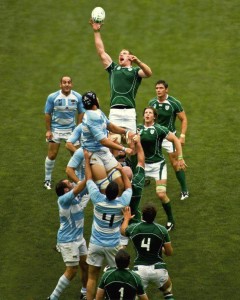 Paul O’Connell – Ireland Rugby by Paolo Camera |
Date: Wednesday 10th October 2012
Time: 7pm, for a 7.30pm start
Place: Upstairs at The Lamb, 92 Lambs Conduit Street, WC1N 3LZ [gmap]
Cost: Free
Fruit flies: The key to a longer life?
|
Thanks to improvements in our understanding of health, we can all expect to live well into old age. While long life has benefits, it also means we are likely to suffer from the diseases of ageing. What if we could understand the biology of ageing, could we develop treatments that address its causes and in so doing, treat all of the diseases of ageing?
Remarkably, recent research has found genetic and dietary treatments that extend healthy lifespan in lab animals. What’s more, the same treatments appear to work in very different organisms from worms to mice, indicating that these findings could be relevant to humans. Dr Matthew Piper will give an overview of the current state of knowledge of ageing research, with a focus on his field of expertise: flies and their food. |
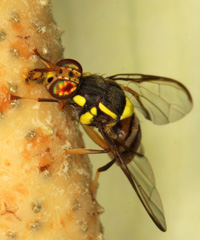 A Rod-horn fruit fly by Gbohne |
Matthew graduated with a PhD in Biochemistry and Molecular Genetics from the University of New South Wales, Sydney. He then moved to Delft, in the Netherlands, to work in an industrial fermentation lab where they developed yeast to make high value scents and flavour compounds, such as the rose scent in perfumes. In 2003, he moved to UCL in the UK to work on ageing, using the fruitfly as a model organism. In 2010 he started his own lab with funding from the Royal Society and the BBSRC. His interest lies in how we can use nutrition to improve lifelong health in to old age.
Date: Wednesday 28th November 2012
Time: 7pm, for a 7.30pm start
Place: Upstairs at The Lamb, 92 Lambs Conduit Street, WC1N 3LZ [gmap]
Cost: Free
« Previous Entries Next Page »
This site is powered by WordPress.
Science London was part of the British Science Association

